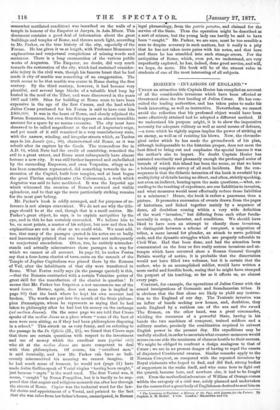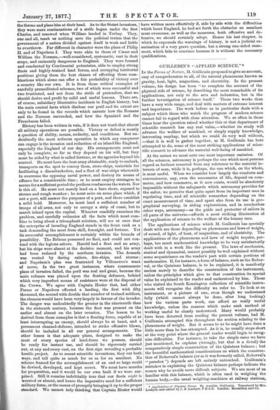HOZIER'S " DTV.A.SIONS OF ENGLAND."*
thy:PER an attractive title Captain Horier has compiled an account of all the considerable invasions which have been effected or threatened since the first landing of Julius Clesar. He has con- sulted the leading authorities, and has taken pains to make his book interesting, as well as instructive. Nevertheless, we cannot avoid the reflection that his professed object would have been more effectively attained had he adopted a different method. If we understand his purpose aright, it is to show the imperative necessity for adequate military as well as naval means of defence, —a term which he rightly argues implies the power of striking at an enemy, as well as of resisting his blows. Now, the chronolo- gical order which he has made the groundwork of his plan, although indispensable to the historian proper, does not seem the best fitted to bring out and emphasize the special lessons it was the author's aim to impart. No doubt Captain Rosier has narrated succinctly and pleasantly enough the prolonged series of inroads of which this island has been the scene, so that we have a tolerably complete survey of all such incidents. But the con- sequence is that the didactic intention of the book is overlaid by a multiplicity of details having no direct, and often, strictly speaking, not even an indirect, bearing upon the main questions,—what, ac- cording to the teaching of experience, are our liabilities to invasion, and what measures would most effectually reduce those liabilities to a minimum? Hence, the book is rather a panorama than a picture. It presents a succession of events drawn from the pages of historians, and linked together mainly by a sequence of dates, all doubtless coming within a very wide definition of the word "invasion," but differing from each other funda- mentally in scope, character, and conditions. We should have liked to have seen an attempt to classify these invasions, to distinguish between a scheme of conquest, a migration of tribes, a mere inroad for plunder, an attack to serve political ends, and the dynastic struggles which are properly referable to Civil War. Had that been done, and had the attention been concentrated on the four or five really serious invasions and at- tempts which have occurred since a Roman General thought Britain worthy of notice, it is probable that the dissertation would not have filled two volumes, but it is certain that the author, who is an accomplished soldier, would have written a more useful and forcible book, seeing that he might have stamped the purport of his teaching, so far as it affects us, on almost every page.
Contrast, for example, the operations of Julius Caosar with the armed immigrations of Germanic and Scandinavian tribes. It is obvious that the first alone are likely to yield any instruc- tion to the England of our day. The Teutonic invasion was an influx of bands seeking new homes, and, doubtless, they made England by a ruthless use of the axe and the sword The Roman, on the other hand, was a great commander, wielding the resources of a powerful State, having in his hands the two machines of conquest, trained soldiers and a military marine, precisely the combination required to subvert English power in the present day. His expeditions may be usefully studied, in order to ascertain what counter-measures would secure on our side the maximum of chances hostile to their success. We might be obliged to confront a design analagous to that of Caosar ; we are in no present danger of having to repel the onsets of disjointed Continental swarms. Similar remarks apply to the Norman Conquest, as compared with the repeated invasions by Royal claimants who hoped to find, and did find, strong bodies of supporters in the realm itself, and who came here to fight out the quarrel, because here, and nowhere else, it had to be fought out. Even the methodical adventure of William of Orange comes within the category of a civil war, solely planned and undertaken for the reason that a great body of Englishmen desired to seat him on * The Invasions of England: a History of the Past, with Lessons for the Future. By Captain A. M. Healer. 2 vols. London : Macmillan and 00. the throne and place him at their head. As to the StuOA invasions, they were mere continuations of a strife begun under the first Charles, and renewed when William landed in Torbay. They, one and all, teach us nothing save the political truism that the government of a nation divided against itself is weak and liable to overthrow. Far different in character were the plans of Philip IL and of Napoleon L They were akin to those of Cresar and William the Norman,—well-considered, systematic, vast in their scope, and eminently dangerous to England. They were formed and conducted by Continental potentates, able to employ strong fleets and highly-trained laud forces, and occupying territorial positions giving them the best chance of effecting those com- binations which alone can offer a fair probability of victory over a country like our own. It is from these critical examples of carefully premeditated schemes, two of which were successful and two frustrated, and not from the strife of pretenders, that we should derive and profit by solid and useful lessons. There are, of course, subsidiary illustrative incidents in English history, but the main central facts which disclose our peril and its extent are only to be found in the records which narrate how the Romans and the Norman succeeded, and how the Spaniard and the Frenchman failed.
History has been written in vain, if it does not teach that almost all military operations are possible. Victory or defeat is mostly a question of ability, means, audacity, and conditions. But un- doubtedly the most arduous operation in which any conqueror can engage is the invasion and reduction of an island like England, especially the England of our day. His arrangements must not only be complete, so far as they depend on his will, but they must be aided by what is called fortune, or the agencies beyond his controL He must have the best army obtainable, ready to embark, transports on the spot to convey them, store-ships, materials for facilitating a disembarkation, and a fleet of war-ships wherewith to overcome the opposing naval power, and destroy its means of offence for a considerable time ; or he must employ stratagem to secure for a sufficient period the perilous roadscroas the waters. Nor is this all. He must not merely land on a bare shore, exposed to storms and rough weather ; he must seize on some place which, if not a port, will answer the purposes of a port, and there establish a solid hold. Moreover, he must land a sufficient number of troops of all arms, not only to occupy a strip of coast, but to march inland upon the capital. Whoever candidly examines the problem, and carefully estimates all the facts which must com- bine to bring about a triumphadt solution, will see at once that the enterprise of invading England stands in the front rank as a task demanding the most from skill, foresight, and fortune. Yet its successful accomplishment is certainly within the bounds of possibility. The Britons possessed no fleet, and could not con- tend with the legions ashore. Harold had a fleet and an army, but his ships were absent at the decisive moment, and his army had been reduced by the northern invasion. The Armada was routed by daring sailors, fire-ships, and storms ; and Napoleon's plan was frustrated by Villeneuve's want of nerve. In the two great instances, where consummate plans of invasion failed, the peril was real and great, because the main reliance was placed upon the floating defences, behind which very imperfect means of resistance were at the disposal of the Crown. We agree with Captain Hozier that, had either Parma or Napoleon effected a landing, the first with fifty thousand, the second with double that number of trained soldiers, the chanceswould have been very largely in favour of the invader. The danger was undoubtedly the greater in the nineteenth than in the sixteenth century, because the fleet was present on the earlier and absent on the later occasion. The lesson to be derived from these examples is that a floating force, capable of at least interrupting an enemy, should always be at hand, and a permanent channel-defence, intended to strike offensive blows, should be included in all our general arrangements. The other lesson is that adequate plans, designed to make the Most of every species of land-force we possess, should be ready for instant use, and should be rigorously carried out, at any and every cost, on the first sign revealing a probable hostile project. As to recent scientific inventions, they cut both ways, and tell quite as much for us as for an assailant. No scheme framed for the accomplishment of an end so large could be devised, developed, and kept secret. We must have months for preparation, and it would be our own fault if we were sur- prised. Still it remains indubitably true that our fleets might be worsted or absent, and hence the imperative need for a sufficient military force, or the means of promptly bringing it up to the proper standard. We cannot help thinking that Captain Holder would
have written more effectively if, side by side with the difficulties which beset England, he had set forth the obstacles an assailant must overcome, as well as the measures, both offensive and de- fensive, we should certainly adopt. Hence his last chapter, in which he expounds the warnings of history, is not a judicial ex- amination of a very grave question, but a strong one-sided state- ment, which fails to convince because it is without the necessary qualifications.



































 Previous page
Previous page